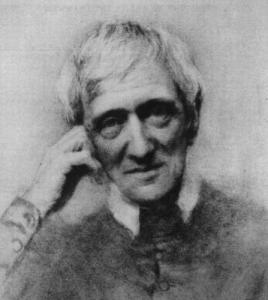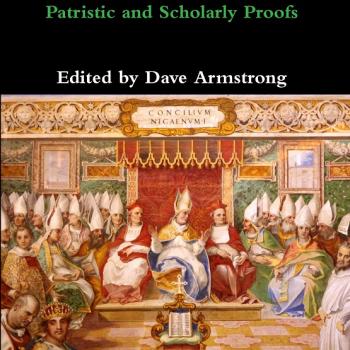[St. John Henry Cardinal Newman (1801-1890): author of arguably the most penetrating and in-depth book about justification ever written (published when he was a Protestant): Lectures on the Doctrine of Justification (1838)]
*
As regards justification beyond the initial instance, I have proven that with my 50 passages having to do with gaining salvation and entrance to heaven (in Part 1): all about works. Heaven and eschatological salvation constitute the ultimate “absolution”: so to speak, and works alongside faith play a key role in that. Moreover, an adult who gets baptized receives forgiveness of sins, regeneration, and justification (many biblical passages on that), or one might say, “absolution” after having decided to undertake the work / action of baptism:
1) Acts 2:38-41 (RSV) And Peter said to them, “Repent, and be baptized every one of you in the name of Jesus Christ for the forgiveness of your sins; and you shall receive the gift of the Holy Spirit. [39] For the promise is to you and to your children and to all that are far off, every one whom the Lord our God calls to him.” [40] And he testified with many other words and exhorted them, saying, “Save yourselves from this crooked generation.” [41] So those who received his word were baptized, and there were added that day about three thousand souls.*
2) 1 Peter 3:18-21 For Christ also died for sins once for all, the righteous for the unrighteous, that he might bring us to God, being put to death in the flesh but made alive in the spirit; in which he went and preached to the spirits in prison, who formerly did not obey, when God’s patience waited in the days of Noah, during the building of the ark, in which a few, that is, eight persons, were saved through water. Baptism, which corresponds to this, now saves you, not as a removal of dirt from the body but as an appeal to God for a clear conscience, through the resurrection of Jesus Christ,*3) Acts 22:16 And now why do you wait? Rise and be baptized, and wash away your sins, calling on his name.’ (cf. 9:17-18)*4) Acts 9:17-18 So Anani’as departed and entered the house. And laying his hands on him he said, “Brother Saul, the Lord Jesus who appeared to you on the road by which you came, has sent me that you may regain your sight and be filled with the Holy Spirit.” And immediately something like scales fell from his eyes and he regained his sight. Then he rose and was baptized, (cf. 22:16)*5) Romans 6:3-4 Or don’t you know that all of us who were baptized into Christ Jesus were baptized into his death? We were therefore buried with him through baptism into death in order that, just as Christ was raised from the dead through the glory of the Father, we too may live a new life.*6) Colossians 2:11-13 In him also you were circumcised with a circumcision made without hands, by putting off the body of flesh in the circumcision of Christ; [12] and you were buried with him in baptism, in which you were also raised with him through faith in the working of God, who raised him from the dead. [13] And you, who were dead in trespasses and the uncircumcision of your flesh, God made alive together with him, having forgiven us all our trespasses,*7) Galatians 3:26-27 You are all sons of God through faith in Christ Jesus, for all of you who were baptized into Christ have clothed yourselves with Christ.*8 ) 1 Corinthians 12:13 For by one Spirit we were all baptized into one body — Jews or Greeks, slaves or free — and all were made to drink of one Spirit.*9) Mark 16:16 He who believes and is baptized will be saved; but he who does not believe will be condemned.*10) Titus 3:5 he saved us, not because of deeds done by us in righteousness, but in virtue of his own mercy, by the washing of regeneration and renewal in the Holy Spirit,*11) John 3:5 Jesus answered, “Truly, truly, I say to you, unless one is born of water and the Spirit, he cannot enter the kingdom of God.*****In summary, baptism:*A) is a means from God of salvation (1, 2, 9-11)B) regenerates and justifies us and raises us to a new life, just as Jesus was resurrected (2, 5-7, 10)C) is God’s instrument to forgive our sins (1, 6)D) washes away sins; cleanses us from them; thus is a means of sanctification (3)E) is God’s means of us receiving the indwelling of the Holy Spirit: which no unregenerate person could possess (1, 4, 8, 10-11)F) brings about inclusion in the rank of saved “souls” (cf. Gal 3:27); membership in the Body of Christ (1, 8 )G) causes us to be buried with Christ, and raised again [see B above] (5-6)
Acts 26:18 to open their eyes, that they may turn from darkness to light and from the power of Satan to God, that they may receive forgiveness of sins and a place among those who are sanctified by faith in me. [Phillips: “made holy by their faith in me”]
Romans 6:22 But now that you have been set free from sin and have become slaves of God, the return you get is sanctification and its end, eternal life.
1 Corinthians 6:11 And such were some of you. But you were washed, you were sanctified, you were justified in the name of the Lord Jesus Christ and in the Spirit of our God.
2 Thessalonians 2:13 . . . God chose you from the beginning to be saved, through sanctification by the Spirit and belief in the truth.
Hebrews 10:10 And by that will we have been sanctified through the offering of the body of Jesus Christ once for all.
Hebrews 10:14 For by a single offering he has perfected for all time those who are sanctified.
Hebrews 13:12 So Jesus also suffered outside the gate in order to sanctify the people through his own blood.
There are so many relevant passages, I may inadvertently repeat some in such a long paper.
St. Paul refers back to Genesis 15:6 (see 4:1-4 for context):
Romans 4:5 And to one who does not work but trusts him who justifies the ungodly, his faith is reckoned as righteousness.
Here is what the Navarre Commentary (Catholic) states about Romans 4:5 and by extension, Genesis 15:6:
The act of faith is the first step towards obtaining justification (= salvation). . . . This first act of faith moves the person to recognize and repent of his sins; to put his trust in God’s mercy and to love him above all things; and to desire the sacraments and resolve to live a holy life . . . God reckons this faith “as righteousness,” that is to say, as something which deserves to be rewarded. It is not, therefore, good works that lead to justification; rather, justification renders works good and meritorious of eternal life. Faith opens up for us new perspectives. [bolding my own]
This comment is very timely, as it confirms my thesis on several points:
1 – The act of faith is the first step to obtaining justification (= salvation): according to the author, there are steps to obtain salvation, which confirms my defense when I say that there are stages of salvation that should not be confused, although they are interconnected.
Then it’s one of many instances where we have a lot in common, as I have also been saying.
Mr. Armstrong often confuses justification with sanctification and salvation.
I don’t confuse them from my own Catholic perspective, only from his, which separates them all into neat little categories.
This does not affect us, but I would like him to give a clear definition, from quotations from Roman Catholic Theologians of each of these points.
2 – This first act of faith leads the person to recognize and repent of his sins; recognizing and repenting is an act of faith, that is, it is already faith in exercise.
This is very important, because we cannot confuse the gift of faith, which is given by God, therefore supernatural, with acts of the intellect, such as believing and recognizing (which are natural acts, since they are acts of the intellect). We can consider faith in itself to be the gift of God, and we can consider it already surrounded by circumstances.
Agreed.
3 – God reckons this faith “as righteousness,” that is to say, as something which deserves to be rewarded.: I ask Mr. Armstrong: what does the author understand by faith here in this context?
Recognizing and repenting of sins, as the previous words stated.
Is it the very act of believing?
It might be regarded as the beginning of that.
Is it a supernatural act of God that man receives passively? I would like clarification on this. Also: is this faith a virtue in itself? These are questions that deserve answers.
It’s describing what we classify as initial justification (or later justification by faith — but not faith alone!): both of which are virtually identical to the Protestant conception of justification. Since Francisco specifically asks, I provide a link to Trent on justification. See especially canons I-III at the beginning. I want him to see what Catholics believe from an authoritative source, so he doesn’t have to only take my word for it. Apart from definitional clarifications of this sort, we have agreed to stick to the Bible. Here is also a relevant portion from the Catechism of the Catholic Church:
1812 The human virtues are rooted in the theological virtues, which adapt man’s faculties for participation in the divine nature, for the theological virtues relate directly to God. They dispose Christians to live in a relationship with the Holy Trinity. They have the One and Triune God for their origin, motive, and object.
1813 The theological virtues are the foundation of Christian moral activity; they animate it and give it its special character. They inform and give life to all the moral virtues. They are infused by God into the souls of the faithful to make them capable of acting as his children and of meriting eternal life. They are the pledge of the presence and action of the Holy Spirit in the faculties of the human being. There are three theological virtues: faith, hope, and charity.
1814 Faith is the theological virtue by which we believe in God and believe all that he has said and revealed to us, and that Holy Church proposes for our belief, because he is truth itself. By faith “man freely commits his entire self to God.” For this reason the believer seeks to know and do God’s will. “The righteous shall live by faith.” Living faith “work(s) through charity.”
4 – It is not, therefore, good works that lead to justification; rather, justification renders works good and meritorious of eternal life. Faith opens up for us new perspectives.: this too became dubious. According to the author, good works do not lead to justification, but according to Mr. Armstrong, good works not only lead to, but justify!
As I have clarified again and again, human-generated works play no role in initial justification, but God-enabled good works do in further justifications after that.
Next, the author says that justification makes good works, which therefore deserve eternal life. This looks more like the Protestant perspective than the Roman Catholic perspective: if justification turns what was once a bad work into a good work, then good works are the fruits of justification, not justification itself or the cause of justification, as Mr Armstrong has defended so far.
I would say it is a practical equation in the two views, as I alluded to earlier.
Dave continues:
Paul uses the example of Abraham in Romans 4, in emphasizing faith, over against the Jewish works of circumcision as a supposed means of faith and justification (hence, he mentions circumcision in 4:9-12, and salvation to the Gentiles as well as Jews in 4:13-18).
[important note: upon further reflection and in part due to the challenge of dialogue, I have retracted the citation from the anonymous former blog regular “Adomnan” in my previous reply. So I won’t defend that. I left it in that reply, in red-colored font, for reference and so that readers won’t be too confused if Francisco refers to it.]
Although the case of Abraham has been worked on earlier, I will make a few observations:
1 – In Genesis 15, at no time, absolutely not, is any good work done by Abraham mentioned. There is not a single reference to any work of any kind.
I agree. The Catholic Commentary of 1953 (edited by Dom Bernard Orchard) concurs, too:
[I]n teaching justification by faith and not by the observance of the Law, the Gospel asserts a doctrine which is not against but in complete agreement with the Scriptures = OT, esp. Pentateuch. . . . ‘Abraham believed God and that was counted to him as justice’, Gen 15:6 LXX, Vg: this is the proof-text. It has a positive and a negative side. The former is the emphasis on Abraham’s faith, the latter consists in the omission of any reference to his works. Both aspects must be taken together to make Abraham a suitable type of the justification of the Gospel by faith without works, 3:27 f. . . . Abraham’s justification by faith, Gen 15:6, took place before his circumcision, Gen 17:9–14, 23–27. The typical significance of this justification of Abraham, therefore, must not be limited to the children of the circumcision (= Israel) only. It is a lesson and example for all. Abraham is first of all ‘the father of the faithful’, . . .
Abraham certainly did good works, accompanied by faith, but that is not the point. This does not exist in the text, being, moreover, denied by the apostle Paul, who says: For if Abraham was justified by works, he has something to boast about, but not before God. Romans 4:2. However, even this is the status quaestionis. For the text says: Now to him who does any work, his reward is not reckoned according to grace, but according to debt. Romans 4:4. What the text is teaching is that he who works is worthy of his wages. In other words, a work cannot receive grace as a reward (because grace is an unmerited favor), but is rewarded according to a debt, and therefore would no longer be the fruit of grace.
Agreed again, as to this passage, though Romans 4:2 is complex and could bear more discussion. I will pass for now, for relative brevity’s sake.
St. James himself will quote a specific event in Genesis 22, but we have already explained that this event did not justify Abraham before God, but justified him before creatures.
And I produced a very lengthy rebuttal of those claims. It did indeed seem to be a work that justified him, and the result was that God made a covenant with him. Phinehas was justified by works, too, just as Abraham was (I just learned of this interesting analogical argument today, from Cardinal Newman):
Psalms 106:30-31 Then Phin’ehas stood up and interposed, and the plague was stayed. [31] And that has been reckoned to him as righteousness from generation to generation for ever.
This refers back to his executing two sinners (of course, a work, and not just faith):
Numbers 25:7-8 When Phin’ehas the son of Elea’zar, son of Aaron the priest, saw it, he rose and left the congregation, and took a spear in his hand [8] and went after the man of Israel into the inner room, and pierced both of them, the man of Israel and the woman, through her body. Thus the plague was stayed from the people of Israel.
As a result, God made a covenant with him and his descendants (just as he had with Abraham), of perpetual priesthood:
Numbers 25:10-13 And the LORD said to Moses, [11] “Phin’ehas the son of Elea’zar, son of Aaron the priest, has turned back my wrath from the people of Israel, in that he was jealous with my jealousy among them, so that I did not consume the people of Israel in my jealousy. [12] Therefore say, `Behold, I give to him my covenant of peace; [13] and it shall be to him, and to his descendants after him, the covenant of a perpetual priesthood, because he was jealous for his God, and made atonement for the people of Israel.'”
So we see that both faith and works can bring about justification, especially by an analogical comparison of the biblical use of this term “reckoning” (and both applied to one person in the case of Abraham; and both types of justification are applied to him in one chapter of one book: James 2):
Faith
Genesis 15:6 And he believed the LORD; and he reckoned it to him as righteousness.
1 Maccabees 2:52 Was not Abraham found faithful when tested, and it was reckoned to him as righteousness?
Romans 4:3, 5, 9, 11 For what does the scripture say? “Abraham believed God, and it was reckoned to him as righteousness.” . . . [5] And to one who does not work but trusts him who justifies the ungodly, his faith is reckoned as righteousness. . . . [9] We say that faith was reckoned to Abraham as righteousness. . . . [11] The purpose was to make him the father of all who believe without being circumcised and who thus have righteousness reckoned to them,
Romans 4:22-24 That is why his faith was “reckoned to him as righteousness.” [23] But the words, “it was reckoned to him,” were written not for his sake alone, [24] but for ours also. It will be reckoned to us who believe in him that raised from the dead Jesus our Lord,
Galatians 3:6 Thus Abraham “believed God, and it was reckoned to him as righteousness.”
James 2:23 and the scripture was fulfilled which says, “Abraham believed God, and it was reckoned to him as righteousness”; . . .
Works
Psalms 106:30-31 Then Phin’ehas stood up and interposed, and the plague was stayed. [31] And that has been reckoned to him as righteousness from generation to generation for ever.
James 2:21-22, 24-25 Was not Abraham our father justified by works, when he offered his son Isaac upon the altar? . . . [22] You see that faith was active along with his works, and faith was completed by works, . . . [24] You see that a man is justified by works and not by faith alone. . . . [25] And in the same way was not also Rahab the harlot justified by works when she received the messengers and sent them out another way?
Faith and Works
Hebrews 11:4 By faith Abel offered to God a more acceptable sacrifice than Cain, through which he received approval as righteous, God bearing witness by accepting his gifts; he died, but through his faith he is still speaking.
Hebrews 11:7 By faith Noah, being warned by God concerning events as yet unseen, took heed and constructed an ark for the saving of his household; by this he condemned the world and became an heir of the righteousness which comes by faith. [arguably, other examples in this chapter as well]
It was a test of whether his faith was alive, and, as we’ve already argued, God didn’t need to know anything he didn’t already know. But Abraham, his son and his posterity, when they read about it, would know that Abraham was a holy man. It is important to note that Abraham lost faith in Genesis 16, and his wife even laughs at God in Genesis 18, which leads us to the need for a proof of faith before men in Genesis 22.
Not only that; if indeed he lost faith, then that would explain the need for an additional justification in Genesis 22. Justification is ongoing and may be a result of faith (Genesis 15:6) or faith + works (Gen 22:1-18; Num 25:7-13 + Ps 106:30-31; Heb 11:4, 7: see above). St. John Henry Cardinal Newman, writing as an Anglican in 1838, explains ongoing justification:
For we must consider that since we are ever falling into sin and incurring God’s wrath [Note 4], we are ever being justified again and again by His grace. Justification is imparted to us continually all through our lives. Now though it is substantially the same from first to last, yet the relative importance of its constituent parts varies with the length of its continuance. Its parts are differently developed as time goes on; and men may seem to differ as to what they understand by it, when they are but surveying it at a different date, and therefore in a different light. A very few words will show this.
The great benefit of justification, as all will allow, is this one thing,—the transference of the soul from the kingdom of darkness into the kingdom of Christ. We may, if we will, divide this event into parts, and say that it is both pardon and renovation, but such a division is merely mental, and does not affect the change itself, which is but one act. If a man is saved from drowning, you may, if you will, say he is both rescued from the water and brought into atmospheric air; this is a discrimination in words not in things. He cannot be brought out of the water which he cannot breathe, except by {102} entering the air which he can breathe. In like manner, there is, in fact, no middle state between a state of wrath and a state of holiness. In justifying, God takes away what is past, by bringing in what is new. He snatches us out of the fire by lifting us in His everlasting hands, and enwrapping us in His own glory.
Such is justification as manifested in us continually all through our lives; but is it not plain that in its beginnings it will consist of scarcely anything but pardon? because all that we have hitherto done is sinful in its nature, and has to be pardoned; but to be renewed is a work of time, whereas as time goes on, and we become more holy, it will consist more in renewal, if not less in pardon, and at least there is no original sin, as when it was first granted, to be forgiven. It takes us then at Baptism out of original sin, and leads us all through life towards the purity of Angels. Naturally, then, when the word is used to denote the beginning of a justified state, it only, or chiefly, means acceptance; when the continuance, chiefly sanctification. Writers, then, of congenial sentiments, or the same writers on different occasions, will speak of it first as consisting in the remission of sins, with Calvin or Melanchthon, next, with the Roman Catholics, as consisting in renewal. (Lectures on the Doctrine of Justification, Lecture 4: “Secondary Senses of the Term Justification“, section 8)
Now I ask, is faith an action? Is faith a work?
No. It’s a supernatural gift from God and His grace, that we cooperate with.
Well, if faith is an act of righteousness, then faith itself becomes a work, against all Biblical theology that says that if it is by faith it is no longer by works.
It’s not a work because Scripture does obviously distinguish between faith and works. But of course works are in close and necessary conjunction with faith (“faith without works is dead, etc.). The Venerable Bede (c. 673-735), commenting on James 2:21, puts both together in a helpful fashion:
James makes deft use of the example of Abraham in order to provoke those Jews who imagined that they were worthy followers of their great ancestor. In order to show them that they did not come up to the mark in times of trial and to test their faith by specific examples, James takes Abraham as his model. For what greater trial could there be than to demand that a man sacrifice his beloved son and heir? How much more would Abraham have preferred to give all the food and clothing he possessed to the poor than to be forced to make this supreme sacrifice at God’s command? James is merely echoing what it says in Hebrews: “By faith Abraham, when he was tested, offered up Isaac, and he who had received the promises was ready to offer up his only son, of whom it was said, ‘Through Isaac shall your descendants be named.’ ” (Heb 11;17-18) Looking at one and the same sacrifice, James praised the magnificence of Abraham’s work, while Paul praised the constancy of his faith. But in reality the two men are saying exactly the same thing, because they both knew that Abraham was perfect in his faith as well as in his works, and each one merely emphasized that aspect of the incident which his own audience was most in need of hearing.
Andreas of Caesarea (563-614) insightfully elaborates on the same passage:
Now someone might object to this and say: “Did Paul not use Abraham as an example of someone who was justified by faith, without works? And here James is using the very same Abraham as an example of someone who was justified, not by faith alone, but also by works which confirm that faith.” How can we answer this? And how can Abraham be an example of faith without works, as well as of faith with works, at the same time? But the solution is ready to hand from the Scriptures. For the same Abraham is at different times an example of both kinds of faith. The first is prebaptismal faith, which does not require works but only confession and the word of salvation, by which those who believe in Christ are justified. The second is postbaptismal faith, which is combined with works. Understood in this way, the two apostles do not contradict one another, but one and the same Spirit is speaking through both of them.
Cyril of Alexandria (c. 376-444), wrote even earlier about this passage:
On the one hand, the blessed James says that Abraham was justified by works when he bound Isaac his son on the altar, but on the other hand Paul says that he was justified by faith, which appears to be contradictory. However, this is to be understood as meaning that Abraham believed before he had Isaac and that Isaac was given to him as a reward for his faith. Likewise, when he bound Isaac to the altar, he did not merely do the work which was required of him, but he did it with the faith that in Isaac his seed would be as numberless as the stars of heaven, believing that God could raise him from the dead. (Rm 4:18-25)
Justification in Catholic soteriology is ongoing. One might draw an analogy to the indwelling of the Holy Spirit. He is first received through baptism: “be baptized . . . and you shall receive the gift of the Holy Spirit”: Acts 2:38; ” ‘that you [St. Paul] may . . . be filled with the Holy Spirit.’ . . . Then he rose and was baptized”: Acts 9:17-18; “by the washing of regeneration and renewal in the Holy Spirit”: Titus 3:5. Yet, despite having already received the Holy Spirit into ourselves at baptism, St. Paul nevertheless refers to an ongoing sense of receiving Him to a fuller degree, too. Both/and once again . . .:
Ephesians 5:18 . . . be filled with the Spirit,
Cambridge Bible for Schools and Colleges comments rather remarkably on this passage:
On the whole, the idea conveyed appears to be that the possessing Power, Divine or evil, which from one point of view inhabits the man, from another surrounds him, as with an atmosphere.—“If the Spirit be in you, you are in It” (Jer. Taylor, Sermon for Whitsunday).
Thus, “be ye filled in (the) Spirit,” may be lawfully paraphrased, “Let in the holy atmosphere to your inmost self, to your whole will and soul. Let the Divine Spirit, in Whom you, believing, are, pervade your being, as water fills the sponge.”
As this infilling of the Holy Spirit has a sense in which it is ongoing, or at least potentially so, so does justification have the same sense of continuation throughout life. St. John Henry Cardinal Newman (again writing as a Protestant) ties both together, showing the relation from Holy Scripture:
In a word, what is it to have His presence within us, but to be His consecrated Temple? what to be His Temple, but to be set apart from a state of nature, from sin and Satan, guilt and peril? what to be thus set apart, but to be declared and treated as righteous? and what is this but to be justified? (Ibid., Lecture 6)
Next, it may be remarked that whatever blessings in detail we ascribe to justification, are ascribed in Scripture to this sacred indwelling. For instance, is justification remission of sins? the Gift of the Spirit conveys it, as is evident from the Scripture doctrine about Baptism: “One Baptism for the remission of sins.” Is justification adoption into the family of God? in like manner the Spirit is expressly called the Spirit of adoption, “the Spirit whereby we cry, Abba, Father.” Is justification reconciliation with God? St. Paul says, “Jesus Christ is in you, unless ye be reprobates.” Is justification life? the same Apostle says, “Christ liveth in me.” Is justification given to faith? it is his prayer “that Christ may dwell in” Christian “hearts by faith.” Does justification lead to holy obedience? Our Lord assures us that “he that abideth in Him and He in him, the same bringeth forth much fruit.” Is it through justification that we rejoice in hope of the glory of God? In like manner “Christ in us” is said to be “the hope of glory.” Christ then is our righteousness by dwelling in us by the Spirit: He justifies us by entering into us, He continues to justify us by remaining in us. This is really and truly our justification, not faith, not holiness, not (much less) a mere imputation; but through God’s mercy, the very Presence of Christ. (Ibid., Lecture 6)
. . . the connection really is between justification and renewal. They are both included in that one great gift of God, the indwelling of Christ in the Christian soul. That indwelling is ipso facto our justification and sanctification, as its necessary results. It is the Divine Presence that justifies us, not faith, as say the Protestant schools, . . . The word of justification is the substantive living Word of God, entering the soul, illuminating and cleansing it, as fire brightens and purifies material substances. He who justifies also sanctifies, because it is He. (Ibid., Lecture 6)
Two chapters earlier (3:19), St. Paul took it even further: “be filled with all the fulness of God”. If that’s not also being justified, what is? How can one be “filled” with the Holy Spirit and “filled” with God’s “fulness” and not be justified? And this is an ongoing process. We receive more justification as time goes on, similarly to how we can and do receive more grace:
Acts 4:33 And with great power the apostles gave their testimony to the resurrection of the Lord Jesus, and great grace was upon them all.
Ephesians 4:7 But grace was given to each of us according to the measure of Christ’s gift.
James 4:6 But he gives more grace . . .
1 Peter 1:2 . . . May grace and peace be multiplied to you. (cf. 2 Pet 1:2)
1 Peter 4:10 As each has received a gift, employ it for one another, as good stewards of God’s varied grace:
1 Peter 5:5 . . . “God opposes the proud, but gives grace to the humble.”
2 Peter 3:18 But grow in the grace . . .
Cardinal Newman brilliantly elaborates upon the scriptural and Catholic doctrine of infused justification as well:
St. Paul . . . says in the fifth chapter of his Epistle to the Romans, “As by one man’s disobedience many were made sinners, so by the obedience of One shall many be made righteous.” He says that by Christ’s righteousness we are made righteous; made, not accounted merely. . . . In the original Greek the word means not merely made, but brought into a state of righteousness. It is the same word as is used by St. Peter, when he says, “If these things,” faith, charity, and other graces, “be in you and abound, they make you,” that is, constitute you as being “neither barren nor unfruitful in the knowledge of our Lord Jesus Christ.” . . . When, then, St. Paul says that we “become righteous” by Christ’s obedience, he is speaking of our actual state through Christ, of that internal nature, frame, or character, which Christ gives us, nor gives only, but constitutes ours. He speaks of our new nature as really righteousness. (Ibid., Lecture 5)
Not only is the word “righteous” applied to Christians in Scripture, but the idea is again and again, in various ways, forced upon us. We read, for instance, of “God working in us that which is well-pleasing in His sight;” of our being “holy and without blame before Him in love;” of Christ, “who is His image,” “shining” and “living” in our hearts; of His “making us accepted” or gracious “in the Beloved;” and of His “knowing what is the mind of the Spirit” in our hearts, because “He maketh intercession for the saints in God’s way.” [Heb. xiii. 21. 2 Cor. iv. 4. Eph. i. 4, 6. Rom. viii. 27.] Such passages, I say, make it clear that acceptableness or graciousness is imparted to us as really as any other excellence belonging to Christ; and if acceptableness be what is meant by righteousness, it follows that the thing as well as the word righteousness is ours in the sense in which it is Christ’s. Christ’s righteousness, which is given us, makes us righteous, because it is righteousness; it imparts itself, and not something else. (Ibid., Lecture 5)
Again: we read of “righteous Abel;” we are told that “Noah was a just man, and perfect in his generations;” that Job was “perfect and upright,” that Lot was “righteous,” that Moses was “faithful in all God’s house,” that Elias was “a righteous man,” that Daniel was “righteous” and “greatly beloved,” that Zacharias and Elizabeth were “both righteous,” that Joseph was “a just man,” that Simeon was “just and devout,” that Joseph of Arimathea was “a good man and a just,” that St. John the Baptist was “a just man and an holy,” that Cornelius was “a just man, and one that feareth God,” that “the righteous shall shine forth as the sun in the kingdom of their Father,” that “the righteous” shall go “into life eternal,” that there shall be “a resurrection of the just,” that “the Law lieth not against a just man,” that a “Bishop must be sober, just, holy, temperate.” We read of the “spirits of the just made perfect,” of “the righteous scarcely being saved,” and of “him who is just becoming more just;” [Matt. xxiii. 35. Heb. xi. 4. Gen. vi. 9. Job. i. 1. 2 Pet. ii. 7, 8. Num. xii. 7. James v. 16. Ezek. xiv. 14. Dan. ix. 23. Luke i. 6. Matt. i. 19. Luke ii. 25. Mark vi. 20. Acts x. 22. Matt. xiii. 43; xxv. 46. Luke xiv. 14. 1 Tim. i. 9. Tit. i. 8. Heb. xii. 23. 1 Pet. iv. 18. Rev. xxii. 11.] but when we would apply these statements to the great evangelical canon, “The just shall live by faith,” as explaining who are the “just” there spoken of, we are forbidden, on the arbitrary assumption that such texts speak of a sort of Jewish righteousness, even though some of them relate to times before the giving of the Law; or that they mean Christ’s imputed righteousness, even though containing in them other epithets which undeniably are personal to us. (Ibid., Lecture 5)
I have already explained in the present work why Paul, when dealing with works of the law, refers to any and all works. I hope we have understood this, which already serves as a rebuttal to the last comment. Paul uses Abraham as our father in faith, implying that we would all be justified in the same way as he, apart from the works of the law.
I’ve already replied to this, in my discussion of “works of the law”, but if that phrase is simply a synonym for “works” then no one could be justified by works (always assumed: alongside or as part of faith). Yet Scripture asserts that Abraham, Phinehas, Rahab, Abel, and Noah were all justified by works (see the examples above in my “chart”). So if my choice here is Francisco’s opinion, which is plainly contrary to that of the inspired revelation of the Bible, I will always go with the latter.
Those among the (Protestant) exegetes who abide by the New Perspective on Paul are infinitely more qualified than I am to further explain the distinction, so I defer to them (for the sake of both quality and expertise of argument and brevity). But Paul is clearly not against works per se, in any event, as seen in many of his passages.
I have already discussed James at the greatest length, too, so I pass on further comment on that issue. This series is far too lengthy and tedious already, to start repeating ourselves. We must have some mercy on our readers! I will, however, address a few new aspects brought up.
The argument of Saint James is from the effect to the cause, that is, he starts with Genesis 22, and only later returns to the antecedent that is Genesis 15. He says that Genesis 22 is the fulfillment of Genesis 15, that is, that Genesis 22 is the effect of Genesis 15, not the other way around, as Mr. Armstrong wants. In order for Mr. Armstrong to be correct, he would have to prove that the works done by Abraham were not an effect of Abraham’s faith in Genesis 15.
This distorts my (and the Catholic) position, which is that justification is ongoing, and can be by faith or by faith + works (where works are mentioned as the cause, while assuming the presence of faith also). So the order is irrelevant. As Jimmy Akin argued, in my citation of his work, Abraham was justified in Genesis 12, again in Genesis 15, and in Genesis 22, “by works.” Genesis 12 is really by faith and works together. God told him to leave his home and trust him for the future, and he did so (a work): “So Abram went, as the LORD had told him” (12:4). Then he built two altars to the Lord (good works again): 12:7-8.
Hebrews describes this as “By faith Abraham obeyed when he was called to go out to a place which he was to receive as an inheritance; and he went out, not knowing where he was to go” (11:8), so it was faith and works. Abraham had the faith to believe God (faith), and he obeyed Him (a work). Genesis 15 describes justification by faith, and Genesis 22, justification by works. Both/and.
We can say that his good works flowed from and were intrinsic to, his faith. None of this poses any problem for the Catholic view. But it’s a huge problem for the Protestant view, since it can only accept justification by faith and not by works, and because these three incidents in Abraham’s life reveal three instances of justification, by both faith and works.
If it’s denied that Genesis 12 is a justification, then it has to be explained how Hebrews 11:8 describes it as Abraham exercising faith. This must be justification in the Reformed sense because totally depraved man (the “T” in “TULIP”) cannot have or exercise true faith. So Abraham was justified then, and again three chapters later (the one Paul takes note of, and Protestants, in an exclusive sense) and again by works seven chapters after that. Extremely unProtestant!
For this reason St. James says, “the Scripture was fulfilled”, just as in the case of Rahab, who was justified when she guarded the spies. Now, justified before whom? Was it not before the spies? Did the prostitute Rahab already have faith? “By faith Rahab the harlot did not perish with the unbelievers, receiving the spies in peace.” Hebrews 11:31. Rahab already had faith, having manifested her faith before men. Faith alone justifies before God; faith and works justify before men.
The notion of being justified before the spies is simply read into the passage (eisegesis). Of course she had faith. It’s always there alongside good works. But, bottom-line; when Scripture comes up with words to describe her justification, it wasn’t by faith:
James 2:24-25 You see that a man is justified by works and not by faith alone. [25] And in the same way was not also Rahab the harlot justified by works when she received the messengers and sent them out another way?
So the Bible says that she had “faith” (Heb 11:31), but when it describes her justification it specifically mentioned works. Faith + works is no problem for us (both/and), but it is for a falsely dichotomous “faith alone” / “justification only by faith” Protestant view (either/or).
James 2 is usually applied by Protestants to sanctification, but that is not what the passage says. It mentions “justified” (dikaioo: Strong’s word #1344) three times (2:21, 24-25): the same Greek word used in Romans 4:2, as well as 2:13; 3:20, 24, 28; 5:1, 9; 8:30; 1 Corinthians 6:11; Galatians 2:16-17; 3:11, 24; 5:4; and Titus 3:7. If James actually meant sanctification, on the other hand, he could have used one of two Greek words (hagiazo / hagiasmos: Strong’s #37-38) that appear (together) 38 times in the New Testament (the majority of times by Paul himself).
Francisco argues that dikaioo has different meanings (as indeed most biblical words, do) and that in James its use is consistent with the Protestant interpretation. I’m afraid I’ll have to pass on this, too, because to get into word meanings to that extent would require great labor (and I am already exhausted with this gigantic three-part reply) and would bore at least 90% of our readers.
Another text quoted is Romans 2.13 which says: For those who hear the law are not righteous before God, but those who do the law will be justified. Romans 2:13 But was it not Armstrong himself who said that the works that justify are not works of the law? Wasn’t he the one who said that St. James is not talking about works of the law?
“Works of the law” is a technical description, as explained. They were particular identifiers of Jewish identity.
So how can these two terms, from Rom 2:13 and the texts of St. James 2:21, be equivalent if in Mr. Armstrong’s mind they deal with different works?
They are not contradictory to each other. Jesus wasn’t hostile to the Mosaic Law per se. He said He came to “fulfill it”, and that the rich young ruler did well in following the Ten Commandments, which would save him, alongside giving away his possessions. Works that happen to do with the Law are in the larger generic category of good works. In this sense, the two passages are harmonious.
However, for us Protestants the text fits, as we believe that both texts deal with justification before men. As you see, Mr. Armstrong’s reasoning proves nothing against us, but it proves our thesis.
I have refuted this notion of “justification before men” at length already. No need to repeat it.
The same word is also used in Matthew 12:37, after the Lord Jesus taught that the tree is known by its fruit. He says that the Pharisees are condemned by their words and also justified by them: because by their words you will be justified (dikaioo), and by your words you will be condemned. Matthew 12:37. That is, we know faith by the person’s actions, for the mouth speaks of what the heart is full of. Mt 12:34. Also Saint Paul, in 1 Cor 4:3-5, when he teaches that we should not judge others by appearance, teaches that we should not care about the human court (justification before men, pay attention to the word court) if our conscience is clean of that we didn’t do anything wrong:
Protestants say this is “justification before men”; we say it is faith and works working together in an organic way. The practical result is the same. Francisco and I, while we argue all these abstract fine points, agree that Christians ought to have faith (which is enabled by God) and go out and do good works, to be a witness of Christ’s love to the carnal, dying, unbelieving world. I would rather work in a soup kitchen or help a troubled, unmarried woman at a crisis pregnancy center with Francisco than engage in these tedious, sometimes downright “byzantine” arguments about words. But as it is, I am an apologist and we are thousands of miles apart. So I do this, but under a certain “protest.”
Francisco then tackles the argument from Jimmy Akin about Abraham’s multiple justifications:
1 – The first point is that no Protestant has ever claimed that the first time Abraham was justified took place in the event of Genesis 15. Both Luther and Calvin and modern exegetes such as Robertson and Carson confirm that justification took place in Genesis 12, or even earlier for St. Stephen says that Abraham was called from the land of Ur of the Chaldeans.
That’s good. I’m glad to hear that. I’m curious to see how this works out in Protestant soteriology, however, in light of Genesis 15. Justification happens once, according to them (especially Calvinists). So how is Genesis 15 explained?
The one who uses this text as proof of justification by faith alone and not by works is Saint Paul in the Letter to the Romans. Protestants only echo his voice. Saint Paul had an objective there: to show that justification is given by faith alone, that is, that Abraham believed and it was imputed to him (he does not infuse righteousness, as Roman Catholics think) for righteousness. St. Paul chooses this text for the simple fact that it is the first text to speak of faith in Scripture. He was not trying to teach when this justification took place, but to show how this justification took place: it was not given by the works of the law, whether ceremonial, civil, moral (that is, of the decalogue), or works of any kind (as has already been demonstrated in this article).
Interesting. So Genesis 15 is simply referring back to Genesis 12 in this view. But there is a serious problem with this interpretation: Genesis 12 and 15 clearly describe two entirely different events: with the latter being later in time than the former (probably a considerable length of time). In Genesis 12 Abraham was in Haran (within present-day Turkey). Then he journeyed to Shechem in Canaan (12:6), Bethel (12:8), and the Negev desert (12:9), as well as Egypt (12:10-20). After that he went back to the Negev (13:1) and Bethel (13:3), let his nephew Lot have the land by Sodom (13:8-11), and dwelt somewhere in Canaan (13:12), eventually settling in Hebron (13:18). Then he engaged in battles by the Dead Se (14:1-17), and met Melchizedek in the vicinity of Jerusalem (14:18-20) and negotiated with the king of Sodom (14:21-24).
Genesis 15:1 starts out with “After these things . . .” and then the chapter describes how God gave more revelation to Abraham about his future, and made a covenant with him about the greatness of his descendants, far more detailed than the information he had revealed to him in the earlier incident. The two events simply cannot be regarded as referring to the same thing. It’s impossible. Francisco tries to argue that Paul wasn’t concerned with the “when”. But the Bible is; or else all the historical detail between Genesis 12 and 15 would not be there. The fact remains that these were two events, far separated in time. And Paul quotes Genesis 15:6, not Genesis 12.
Francisco says that Protestants en masse claim that Abraham’s first justification “took place in Genesis 12, or even earlier”. Okay; duly noted. But if he was truly justified, then that was a one-time, non-repeatable event, and it could not be lost (so believe Calvinists). Why, then, is he justified again in Genesis 15? It’s a problem for them; not for us.
Saint Paul quotes Genesis 12 and ratifies again that justification is given by faith alone. St. Paul says: Just as Abraham believed God, and it was counted to him for righteousness.
Romans 4:3 is a citation of Genesis 15:6 (as my RSV footnotes verify, and a bunch of classic Protestant commentaries on Romans 4:3). The word “believed” doesn’t appear in chapter 12 (RSV). The first time it appears in Genesis is at 15:6. The same is true regarding the word “righteousness” (15:6). Nothing in Genesis 12 remotely qualifies as a prospect for Paul’s citation of Scripture in Romans 4:3.
Know therefore that those who are of faith are children of Abraham. Now the Scripture, foreseeing that God would justify the Gentiles by faith, preached the gospel first to Abraham, saying, In you all the nations shall be blessed. Galatians 3:6-8
Paul does cite Genesis 12:3 (“by you all the families of the earth shall bless themselves”) here, and I assume this is what Francisco meant (rather than Romans 4:3). It doesn’t expressly say that this is his first justification (and the word “faith” never appears in Genesis), but Hebrews 11:8-10 strongly implies it, and Francisco reports that Protestants think he was justified then. That makes it at least twice, even in their view, but I don’t see how this squares with their soteriology. I don’t think Francisco’s explanation is coherent or plausible:
First he quotes Genesis 15:7 and then he associates this event with Genesis 12 when he quotes it when he says: All nations will be blessed in you. That is, Abraham had his righteousness imputed by faith alone in Genesis 12, and in Genesis 15 this declaration of righteousness is placed at the juncture of the patriarch’s life to emphasize the fact that nothing was added to faith as the way to righteousness. During Abraham’s life, nothing was added to his faith to be justified, either before or after, Abraham remained justified by faith alone, that’s what we learn here, whether before, after or at the end of life, Abraham remains justified by faith alone.
He’s trying to make the square peg of Reformed soteriology about justification fit into the round hole of Scripture, and it just doesn’t work, because the meaning of Genesis 15:6 is crystal clear, which is why Paul cited it specifically as a prooftext for justification by faith. Because Calvinism requires a one-time justification, Francisco has to somehow make Genesis 12 that one time, and explain away Genesis 15:6 as a mere reiteration. But unfortunately for him, the actual texts do not support this novel interpretation.
I would also like to point out that Abraham lost faith in Genesis 16, forgetting the promise that God gave, the same promise whose belief was imputed to him for righteousness, while St. James calls him righteous all along. Not only he, but his wife Sarah mocks God when she hears that she is going to conceive a child. He forgot the promise, had a child with a woman who was not his, something all theologians disapprove of,
Concubinage was an accepted cultural practice in the Ancient Near East and the later Mosaic Law — proclaimed by God to Moses — allowed it (“another wife”: Ex 21:10; “two wives: Dt 21:15).
and we need only look at the result to see that it was God’s utter displeasure.
It wasn’t ideal, but it was temporarily allowed by God. I don’t second-guess Him.
If justification were a process, surely Abraham would have ceased to be righteous,
That’s precisely what did happen, according to Francisco, since he said that he “lost faith”. If that’s true, then according to Reformed soteriology, he could not have been justified before that time. But he says that Protestants do believe he was justified in Genesis 12. Something has to give. We say it is the false doctrine of a one-time, irrevocable justification. Justification is a process because the Bible says Abraham was justified at least three times (these are the only times that were mentioned).
and I do not see how such a fact could have been ignored by all the men of Scripture.
It wasn’t. But the facts of Scripture along these lines are misunderstood by Protestants.
But instead of unjust, everyone remembers Abraham as righteous, because justification does not depend on our works.
No; it’s because he was generally righteous, but not perfect, like virtually all role models of faith that we have.
If it had depended [on works], surely Abraham would have lost his justification.
His case confirms that justification is ongoing, whether one “falls away” for a time or not.
After that, we discussed the text of Romans 5:9: “Much more now, having been justified by his blood”
Now notice that, in his reply, Mr. Armstrong did not even touch on my argument. My argument is that the Christ of faith won our righteousness on the cross.
That’s not true. I replied: “At first, yes (initial justification). But then we must ‘work out’ our salvation and complete our faith.” I was agreeing with him and reiterating that our initial justification is virtually identical with Protestant justification by faith alone. Then I went into areas where we disagree.
Mr. Armstrong’s answer boiled down to showing texts that show a need for sanctification, but not the moment when we receive Christ by faith.
Francisco stated that all the passages I presented “have nothing to do with justification” and “Such verses cannot be refuted, because they do not even deal with the subject”. I understand that from his perspective, they don’t. From ours, they do. So I don’t care if he passes over them (this debate is more than long enough as it is). It’s to be expected that we will run across instances like this as we debate. Debaters often disagree on what is relevant to a topic.
As St. Paul says: “Who shall bring an accusation against God’s elect? It is God who justifies them” (Rom 8:33). Christ himself is our righteousness; therefore you are of him in Christ Jesus, who became for us wisdom from God, righteousness, sanctification and redemption, so that, as it is written, glory in the Lord”. Preaching in the power of the Spirit. (1Cor 1,30-31). Christ is the perfect righteousness that is apprehended by faith alone, we must glory in Him, in His works, and in His merits.
Mr Armstrong again did not directly answer my question, he says:
This was all good, except when it got to faith alone, which is unbiblical, as already abundantly shown. We must conform our views to the Bible, not vice versa.
And once again, Francisco confuses almost total agreement with a non-answer. I was saying I agreed with all that, save for faith alone.
Where has it been shown that the righteousness of Christ can be earned by man through any work? Where, Mr. Armstrong? You have not answered my argument, . . .
It can’t. That’s not our view. What this expresses is Pelagianism or works-salvation, which we condemned almost 1500 years ago. I can’t defend what I don’t believe and what my Church vehemently condemns.
When I said that St. James spoke to libertines and St. Paul spoke to Epicureans, I did not mean it literally, but I used metonymy. What I meant was that those believers that St. James was addressing were being admonished because they were acting like libertines and St. Paul was addressing believers who were acting like Epicureans.
Duly noted; thanks.
Demons have faith, but not faith in Christ, demons have no faith in the saving work of Jesus, in his blood that cleanses from all sin. The text of St. James comes as a bucket of cold water to anyone who believes that justification is a process and that faith is a type of righteousness. If faith were a type of righteousness, or had a virtue in itself, and too much faith would increase our justification—and vice versa, that is, that little faith would diminish our justification—then devils must also be justified, for it is asserted that they too have faith. But the cause of justification is not faith, but the Christ of faith who has a perfect righteousness and sheds his blood on the one who has faith in Him! It is the object of faith, which already has perfect righteousness, which justifies, not faith as righteousness or a virtue. Thus, it is impossible for justification to be a process, for the justification we have comes from the perfect work of Jesus on the cross. His obedience is perfect. Saint Paul, when asked how we were justified, answers fully: by the obedience of Christ. Rom 5.19.
I believe that I have answered these things somewhere in the three parts . . .
Here, I take the opportunity to leave one more dilemma for Mr. Armstrong. See the following argument: Saint Paul says, “Christ, who was without sin, was made sin for us” (2 Cor. 5:21). Note that Christ took away our sins once and for all, not in a process.
Of course He did so. But how His complete, finished work of redemption on the cross unfolds in our lives is a process. The fact is that most of us keep sinning (real sin that has to be “really” dealt with and cleansed, not merely declared as irrelevant, as “under the blood of Christ and our past justification), and so that is what makes us a “work in progress”; hence, justification, sanctification, and the attainment of eschatological salvation (heaven) are all processes.
Hence we say that the justified man is both righteous and sinful, just as Christ was both righteous and sinful when he took our sins upon himself. Christ was inherently righteous and declaratively sinful.
Jesus has no sin whatsoever, in any sense. To declare such is blasphemy. Scripture is non-literal in referring to Him being “made sin.” It means that He died for our sins.
Now, I ask: if justification is an ontological change as is sanctification, then am I to understand that when Christ received our sin there was a change in Him? I’m looking forward to this answer.
It’s a meaningless, nonsensical, incoherent question, so I can’t answer it. Jesus in His Divine Nature is immutable. And He not only did not sin (sinlessness), but could not ever sin (impeccability).
Francisco then reiterates a bunch of things that either we already agree with (but he doesn’t realize it) or that have been dealt with already in my long response.
I thank him for a vigorous response and challenge and a complete absence of personal insults: the latter being so common in Internet discourse today. Adherents on both sides can learn a lot from our exchange, I think. And they will all the more if we can continue to conduct ourselves in a charitable Christian manner.
If anything I write is deemed “harsh” I assure all readers that I am solely focusing on opinions and ideas, not on my dialogue opponent as a person.
***
Practical Matters: Perhaps some of my 4,000+ free online articles (the most comprehensive “one-stop” Catholic apologetics site) or fifty books have helped you (by God’s grace) to decide to become Catholic or to return to the Church, or better understand some doctrines and why we believe them.
Or you may believe my work is worthy to support for the purpose of apologetics and evangelism in general. If so, please seriously consider a much-needed financial contribution. I’m always in need of more funds: especially monthly support. “The laborer is worthy of his wages” (1 Tim 5:18, NKJV). 1 December 2021 was my 20th anniversary as a full-time Catholic apologist, and February 2022 marked the 25th anniversary of my blog.
PayPal donations are the easiest: just send to my email address: apologistdave@gmail.com. You’ll see the term “Catholic Used Book Service”, which is my old side-business. To learn about the different methods of contributing, including 100% tax deduction, etc., see my page: About Catholic Apologist Dave Armstrong / Donation Information. Thanks a million from the bottom of my heart!
***
Summary: Brazilian Protestant apologist Francisco Tourinho presents a summary of Protestant justification & faith alone. I reply with numerous contrary biblical passages.
***


















